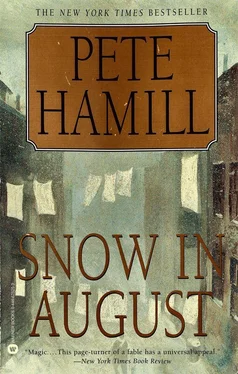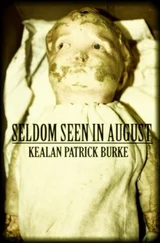“Good, good,” he said. “Today we learn the words for food.”
It was as simple as that. There was no mention of the cops. There was no mention of Mister G, or crimes, or justice. The rabbi told Michael that bread was broyt and butter was putter and proper Jewish food had to be kosher. They had resumed their routine. Everything was as it had been. Except at night, when Michael saw faces in the dark.
Michael did not spend every afternoon under the tutelage of Rabbi Hirsch. Nor did his every waking vision turn on the menacing figure of Frankie McCarthy and his knife. As the snows melted and a chilly spring eased in, he and his friends were increasingly absorbed with the coming of Jackie Robinson. For Michael, such talk was a relief, a way to avoid discussing the images that stole his sleep.
“This is screwy,” he said one afternoon, as they moved together through the raw weather of the Brooklyn streets. They were still wearing their winter clothes. “The Dodgers are training in Cuba this year, instead of Florida. Because of Jackie Robinson.”
“How come?” Jimmy Kabinsky asked.
“Because he’s a Negro, Jimmy,” Michael said, using the word that his mother insisted was the polite way to describe colored people. “They don’t let Negroes in the hotels in Florida.”
“I don’t know how they could get away wit’ that in Florida,” Sonny Montemarano said. “There’s colored people all over Florida.”
“How do you know?” Jimmy said. “You never been to Florida.”
“My brother told me. He was down there durin’ the war. He says, some places they got more colored people than white people down there.”
“So where do they stay if they’re driving someplace?” Michael said.
“They have colored hotels, I think. You know, only colored people.”
“So how come Jackie Robinson can go to a hotel in Cuba?” Jimmy asked.
“Because they have a lot of colored people in Cuba,” Sonny said. “I guess there’s so many of them in that Cuba, they can go anyplace.”
And so it went, as they wandered through the parish, avoiding the Star Pool Room, crossing the street if they saw a group of the Falcons moving along the avenue with their pegged pants billowing in the breeze. Michael noticed something about himself on these wanderings: when he was with his friends, he had to talk and act older, which was to say, tougher, more cynical, more knowing; when he was with Rabbi Hirsch he could act his own age. He even walked differently with his friends, falling into the rolling gait that Sonny had adopted from some of the Falcons.
This often made him feel like two people. He assured his friends that he was still keeping his eyes open at the synagogue, while teaching English to the rabbi, but so far there was no sign of treasure or a map. Technically, he was being truthful; there was no treasure to be found, except in the stories told by Rabbi Hirsch and in the books on his shelves. But Michael wasn’t being completely truthful. He didn’t tell them how much he liked Rabbi Hirsch. He didn’t tell them about Prague and Rabbi Loew, Brother Thaddeus and the Golem. Those were his possessions: private, special, as alive in his mind as Sonny and Jimmy Kabinsky, but kept in separate boxes. They even rose from those boxes in his mind and came to him now in dreams. Besides, if he told his friends too much, they might suspect him of going soft, of shifting loyalties. They would treat him as if he were different. He could not imagine what they would do if they ever saw him in a yarmulke.
Baseball was easier to talk about. There was little argument about whether Jackie Robinson could hit big league pitching. All the sportswriters thought he could. They knew he could run too. And field. On Ellison Avenue, they talked about the color of his skin.
“The guy was in the army, right?” Sonny said. “Well, f’ my money, if he can fight for his country he oughtta be able to play in the major leagues. Case closed.”
“Why would he want to go where he ain’t wanted?” Jimmy said.
“Because he can!”
They knew from the newspapers that Robinson had played the 1946 season for the Montreal Royals, the number one Dodger farm team, and tore up the league. Down in Cuba, he was still on the Montreal roster. The Brooklyn Eagle and the Daily News said the Royals would play a series of exhibition games against the Dodgers during spring training and then Branch Rickey, the boss of the Brooklyn team, would decide whether to bring up Robinson. But the newspapers were full of a word that was new to Michael and his friends: dissension . The sports writers used the word as if it were the name of a fatal disease.
“This thing, this dissension, you know, it could ruin a ball club,” Sonny said.
“What do they need it for?” said Jimmy. “Why don’t they just leave things alone and win the pennant? Last year, we was tied for first on the last day of the season. That’s a pretty good team.”
“Not as good as the Cardinals,” Michael said. “The playoffs, suppose Robinson had played. The second game, he gets a triple, steals a couple of bases, maybe forces a third game. Then in the third game he homers in the ninth, and we go to the World Series in Boston, not the Cardinals.”
“I don’t like that dissension,” Sonny said.
Dissension was all about the new colored player. The newspapers were reporting that Dixie Walker, “the People’s Cherce,” had asked to be traded if Jackie Robinson joined the team. Dixie Walker was a southerner. From Alabama or Georgia or someplace. “You know,” Sonny said, “down there where they had that slavery all those years.” Everybody on Ellison Avenue thought that Dixie Walker was also the greatest right fielder in Dodger history. The boys knew that Walker had won the batting championship in 1944, when he hit.357, and Dodger fans weren’t used to their players winning much of anything. But the newspapers now said Dixie Walker had caught the terrible dissension disease. And he wasn’t the only one. There were others, including Eddie Stanky, the second baseman.
“That ain’t dissension,” Sonny said. “He’s worried about his job.”
“What do you mean?” asked Jimmy.
“He’s a second baseman , Jimmy! And Robinson’s a second baseman!”
“Jeez, I never thought about that.”
“Think, Jimmy, think. Some of these guys got angles! ”
Walking along the parkside, under the dripping trees, they talked about what position Robinson would play and how the manager, Leo Durocher, would never replace Stanky with a rookie. But maybe Robinson could play first, and there was always third, where the Dodgers were weak. And hey, maybe this wouldn’t happen at all. Maybe dissension would get so terrible that Durocher would go to Rickey and say that as the manager, he couldn’t do it, it was tearing the team apart, and Jackie Robinson would stay in Montreal. How could Dixie Walker put his arm around Jackie Robinson and say all for one and one for all?
At night, Michael struggled to make sense of this. He wished that Jackie Robinson was white, like everybody else. If he was white, they would bring him up and make him the goddamned first baseman and that would be that. No dissension. No trouble. No spring training in goddamned Cuba. Why did Jackie Robinson have to be colored, for Christ’s sake?
But he was. And down on Ellison Avenue, they were predicting race riots at Ebbets Field. If Jackie Robinson struck out or dropped a ball or was hit by a pitch, it would be worse than Harlem in 1943, or the riots in Detroit or Los Angeles, where people were shot and stabbed by the hundreds. They said there’d be muggings at the ballpark. They said Robinson would ruin the Dodgers with dissension and they’d be lucky to finish fifth. Michael wondered if maybe Dixie Walker knew more about all this than he did. Maybe Dixie was afraid that more and more colored people would come to the big leagues and pretty soon even the white players would be calling each other motherfuckers.
Читать дальше












